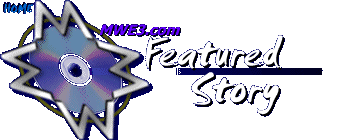OLD HABITS DIE HARD...
an interview with
DAVE STEWART
by Robert Silverstein
Back in 1983, the pop music world exploded with a catchy, upbeat dance
track called “Sweet Dreams (Are Made Of This)” by the Eurythmics—the
now legendary post modern electronic rock duo featuring guitarist
David A. Stewart and singer Annie Lennox. A master songwriter and
producing legend, Dave Stewart earned a stellar reputation in the
music world and he honors his own legacy with his 21 track 2008 double
CD, The Dave Stewart Songbook Vol. One by Dave Stewart And
His Rock Fabulous Orchestra.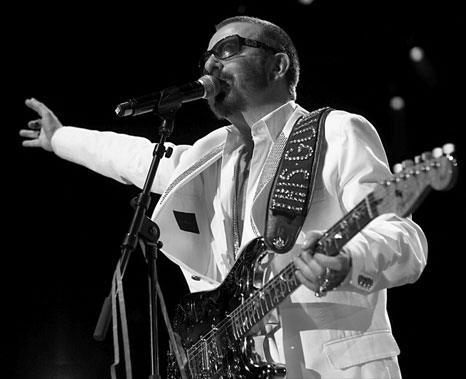 To accompany the CD, Stewart has also released a mammoth 300 page
book that chronicles the history of the songs on the CD. Inspired
in part by the recent orchestral rock works of his guitar slinging
buddy Brian Setzer, Stewart sets about rerecording classic Eurythmics
songs that rocked the charts back in the ‘80s, while also revisiting
songs he’s written over the years with rock luminaries such as
Tom Petty, Mick Jagger and Jon Bon Jovi. The Songbook highlights
several new female vocalists that take on the role of Eurythmics co-founder
Annie Lennox, and with guitar in hand, Stewart & company rock
the classics. Continuing on the cutting edge of rock and pop, Stewart
no doubt captivated a number of new fans and old with his Rock Fabulous
tour of 2008. The double CD Songbook
set is an excellent snapshot of Stewart's latest sound
in the studio. Don’t miss Dave next time he comes back to your
town. Discussing his Songbook
CD, guitars and a long and colorful life in the music world, Dave
Stewart spoke to Robert Silverstein on July 14, 2008.
To accompany the CD, Stewart has also released a mammoth 300 page
book that chronicles the history of the songs on the CD. Inspired
in part by the recent orchestral rock works of his guitar slinging
buddy Brian Setzer, Stewart sets about rerecording classic Eurythmics
songs that rocked the charts back in the ‘80s, while also revisiting
songs he’s written over the years with rock luminaries such as
Tom Petty, Mick Jagger and Jon Bon Jovi. The Songbook highlights
several new female vocalists that take on the role of Eurythmics co-founder
Annie Lennox, and with guitar in hand, Stewart & company rock
the classics. Continuing on the cutting edge of rock and pop, Stewart
no doubt captivated a number of new fans and old with his Rock Fabulous
tour of 2008. The double CD Songbook
set is an excellent snapshot of Stewart's latest sound
in the studio. Don’t miss Dave next time he comes back to your
town. Discussing his Songbook
CD, guitars and a long and colorful life in the music world, Dave
Stewart spoke to Robert Silverstein on July 14, 2008.
{The following interview with Dave Stewart first appeared as the cover
story of the October 2008 issue of 20th Century Guitar. MWE3.com proudly
presents the interview in it's complete, unedited version}
MWE3: Dave great to meet you. What’s going on in L.A.? You must
have a ton of stuff going on.
DS: What’s going on in L.A.? It’s the final day of handing
in my 300 page book which is full of 21 songs and all the stories
behind them. And each story is about five or six pages and then there’s
music. You know, the actual sheet music and the lyrics and full of
photographs I’ve taken over the years. There’s like Tom
Petty, Mick Jagger...all the people I’ve written with. So I’m
in front of a table that’s scattered with hundreds and hundreds
of images. The book is being sent to the printers on Wednesday. So,
(laughter) that’s what's happening in my life in L.A. right now.
MWE3: I love L.A.
DS: When you’ve traveled the world so much, you tend to like
a little piece of everywhere. So I love certain things about New York,
I love certain things about Australia, London. So you just have to
have them all like diamonds in your head.
MWE3: Can you give a little background on the new Dave Stewart songbook
album. It’s great to revisit these songs and inform a new generation
who missed them the first time around.
DS: Or maybe they didn’t realize I wrote them. (laughter) It’s
been a good, interesting kind of journey for me because I had to deconstruct
the songs and then recreate them with my band and a full orchestra.
And something that was purely electronic, like “Sweet Dreams”
which I love as an electronic piece...it was how am I going to make
this really unusual, different with a full band and orchestra.? And
then I decided to make the middle part of the song the intro. Have
you heard the CD?
MWE3: The remakes are much more dramatic.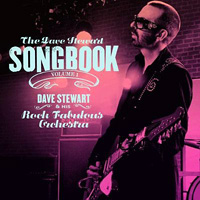
DS: Yeah. Every song, I had to go through with the same thing of ‘how
do I then recreate this in a way that we play live and I’ll really
enjoy playing it?’ I’ve had a really great time figuring
all that stuff out. But obviously, it was a lot of work. 21 songs
in a row. And all those arrangements. And then my bright idea to do,
‘oh, let’s do a whole book!’ You know what its like
as a writer. You start getting very anal about...’cause the stories
were all real, what really happened. And getting all my facts correct
because this was from a time when I might have been (laughter) slightly
on another planet. And putting it all together. Then all the photographs.
It’s been a lot you know, to put together. And rehearsing all
the acts.
MWE3: How challenging was it to work with what you call your 30 piece
Rock Fabulous Orchestra?
DS: The Rock Fabulous Orchestra is the key word you see, because it
really isn’t a rock fabulous orchestra. It’s basically a
mixture, a complete marriage of rock music with strings rather then
making a sort of a classical version of a rock song. It’s like,
‘No, we’re going to play “Missionary Man” tough
as ever but we’re gonna have brass and cellos and double bass
going (makes orchestral cello sounds) along with my electric guitar.
I didn’t want to just make everything suddenly go all light and
orchestral. I wanted to sometimes to make it be heavenly and sort
of magical but other times be raw and belting. So doing all of that
is obviously...it’s a lot of brain work. And I worked closely
with Michael Bradford. He also plays bass in the band. And I think
we’ve created something that marries it all together.
MWE3: Are you planning to tour with a 30 piece orchestra?
DS: Well what we do is, we created is, we have every song in score.
So we can make up bits of the orchestra in various places. And we
can accommodate all different shapes and sizes of arenas. So we have
a core that can play everything and then we augment parts of the orchestra
from different places.
MWE3: You have a silver Strat?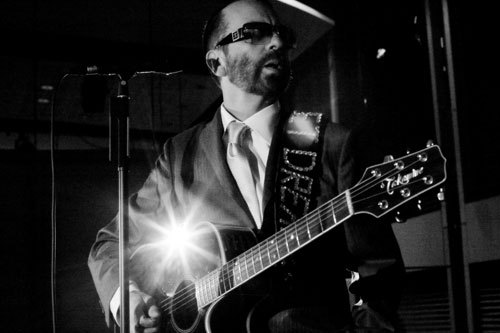
DS: Yeah, I use a silver Strat a lot. It’s all engraved and it’s
kind of hollow but it feels solid. It’s got some unbelievable,
sort of pure sound about it when you have it clean. And then as soon
as you bring edge in, even the slightest amount of edge, you can get
sustain so easily because of the, just the nature of it. It’s
made of this hollow kind of metal. Everything about it actually lends
itself to playing on certain numbers. Like on “Here Comes The
Rain Again” type numbers where I go from a semi clean sound to
then a solo that sounds very sort of cutting and edgy. I don’t
mean sustain, like being fuzz sustain or bluesy sustain. And then
I’ve used a Takamine acoustic guitar. That same blue Takamine
acoustic guitar since 1993. And I bought many other different kinds
and none of them matched it till...I just got one made by Brian Calhoun.
It’s got Rockfabulous written in it. Have you seen that? It’s
a white one and I’ve got a jacket that says Rockfabulous on my
sleeve and a guitar that has it in mother of pearl in it. Brian Calhoun
made it. His company is called Rockbridge. They’re beautiful
handmade guitars. I’ll send you to their site so you can get
it correct.
MWE3: Is the silver Strat a custom guitar?
DS: No. Actually I was with Lou Reed in New York and we were down
in the Village. I was having a guitar made which was bloody stolen
about a week later. And Lou was having one made somewhere. And then
I was in this other guitar shop and they just had this guitar but
somebody had bought it. And I said, ‘Oh, my god, I want one of
these.’ And fortunately Fender somehow got another one. I haven’t
seen another one. Have you ever seen anybody else playing one of those?
I’ve never seen one anywhere.
MWE3: Do you have a signature guitar coming?
DS: Well, its funny. I’m in some talks about that right now.
I’ve created this whole thing around the Rockfabulous brand.
So I have various things coming out that are under the brand name
Rockfabulous. And I’m in talks right now about that particular
thing to do with musical instruments, amplifiers and accessories.
And I also have a whole line of clothing and stuff with my partner.
The thing its about really is, there’s something about that side
of rock and roll that’s elegantly, decadently wasted if you know
what I mean? (laughter) It’s like okay, I loved rock and roll
when I was a kid, I love rock and roll now. Now I’m a lot older.
And I love great things, like that beautiful silver Strat, right?
I also like quality things like quality songs, quality instruments
and I like quality things to wear that still expresses how I feel
like, which is like a rock and roll type person. Which doesn’t
mean to say that I’m sort of staggering around the house being
drunk. You know what I mean? It’s elegantly wasted. (laughter)
Its like a vodka martini but my jacket looks amazing and my jeans
are tattered. There’s something about staying true to your dreams.
And a lot of people, they grew up and they turned into the parent
and they go, ‘how did that happen?’ Although my kids are
going to have a hard time. (laughter) They’ll go, ‘Oh no!
I’ve turned into my dad!’
MWE3: I like your company name WME, Weapons of Mass Entertainment.
You’re only one letter away from WMD!
DS: Exactly! You know its funny, ‘Cause I think that change comes
about often not by lecturing people, but by entertaining them. And
that happens in song writing a lot. I mean I write a song called “Sweet
Dreams (Are Made Of This)” I’m not sort of singing some
kind of lecturing song about the world. I’m sort of singing,
making people sort of think about this kind of odd world we’re
living in here. And the same thing, we create in Weapons Of Mass Entertainment.
Whether its the idea of a film, or an idea of a lifestyle, or an idea
of a video or an artist somehow being developed. It’s all the
same thing. It’s like you can come back with a double attack
to the world, through a form that people...and it’s in a commercial
marketplace. Like I always describe a lot of the people who are trying
to do a holier than thou kind of like concept about saving the world
and the charities thing. The thing is, you’ve got to grab people’s
attention. And to grab people’s attention, one of the easiest
ways is through entertainment, humor, music...all these things. And
then it depends how and what you do with it.
MWE3: Interesting that you’re having Surfdog release the double
CD Songbook set.
DS: Yeah, well the thing is, how this happened was I’m a big,
massive fan of Brian Setzer and his guitar playing. And actually years
ago, Brian and I would hang out together, and we wrote a couple of
songs together. We used to ride these motorbikes together. And then,
when I wanted to do this thing with an orchestra I noticed by coincidence
that he created his orchestra and he was managed by a guy called Dave
Kaplan. And if so, I said, well this guy knows how to get this together,
right? Brian plays with his rockabilly orchestra and they’ve
got all these horn players, it’s brilliant you know. And so I
think many managers go ‘oh, my god, no, no it’s a nightmare.
It’s too big to take on too many people.’ But when I went
to see Dave Kaplan, he was like, ‘I love it!’ Then I said,
‘I want to do a book,’ and he goes, ‘Oh, I love that,
let’s do that as well.’ ‘I want to make a 21 track
CD, not a 4 track EP on itunes.’ He goes, ‘Fine. Let’s
do that as well.’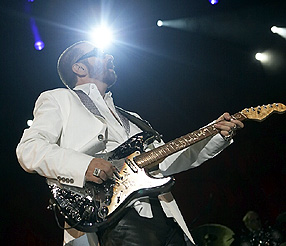
MWE3: The sound of the double CD is great and after seeing that amazing
booklet that comes with the CD it’s clear a lot of work went
into it.
DS: And the book is like 300 pages. You can imagine, it’s a big,
thick coffee table book. You know the Tom Petty book that just came
out? That’s got like 230 pages, it’s like a thick thing.
And a lot of work, going through photo archives and all the photos
I’ve taken. Stories and stuff...but it’s a labor of love
because these songs are not like throwaway songs that were knocked
up to try another hit. (laughter) They were songs that were carved
out of the most mad situations. Hey listen, the guy that made the
guitar, when you get that white picture? It’s called Rockbridge
guitars. Rockbridge. And he’s called Brian Calhoun, who made
it. And it’s a beautiful guitar. Small, acoustic and I said,
‘I want it as light as possible, as small as possible, but as
loud as possible,’ which is a very difficult thing for a guitar
maker to do.
MWE3: A lot of people still want to hear about your Eurythmics partner
Annie Lennox. Will there ever be a Eurythmics reunion?
DS: Annie and I never say or said to the press that we’re never
going to play again together. Our relationship started off as a couple
living together. And then we had a different group called The Tourists.
Then that band broke up and then after four years we broke up as a
couple and decided to form a duo called Eurythmics. It’s just
like 28 years or something of relationships. So we e-mail each other
every other day. We chat. We’re both aware of all the things
that the other one is doing. We both get offered things all the time
from promoters or stuff to play live. But at the right time. Annie
and I again, none of our stuff is contrived. So it might be at 60
years old, on my 60th birthday we play the Albert Hall and play our
songs with an orchestra. Or we might decide to play the opera houses.
We just leave it open.
MWE3: What was it like working with Ringo on his 2007 Liverpool
8 album?
DS: That was quite fun because funny enough, the only Beatle I didn’t
get to work with was John Lennon because obviously he got shot. But
I worked alongside Yoko and I did the John Lennon tribute. I was the
musical director at the Radio City Music Hall and also saw the Liverpool
thing. And I worked with Paul McCartney in the studio. George Harrison
and I were great friends. I interviewed him for four hours. We would
jam and play together all the time. And then, I’d occasionally
met Ringo but when we suddenly started to connect...Ringo was busy
making an album and I came and played guitar on it. And then he played
drums on this thing I was doing called Platinum Weird. And then I
was playing something and he said, ‘Oh, that sounds great, let’s
write that,’ and I said, ‘Okay.’ And I came round his
house and had this concept, ‘Let’s write a song about you
coming from Liverpool as a young lad all the way through to Beatles
fame all in one three minute song.’ We wrote that and then we
wrote another one and then he said, ‘Hey why don’t we play,’
and I said, ‘Okay.’ And we went to Liverpool and played
for 500,000 people from up in the air on a tower or something. It
just was insane. Larry King Live and then Live From Liverpool on American
TV. He’s arriving in L.A. tomorrow actually so I’ll see
him. Ringo. And he’s a lovely guy, he’s very sweet and fun.
Then I have this HBO thing I do where I interview him. And I interviewed
U2, three hours and then Ringo and then edited it down to an hour.
And so I got right under his skin and lots of stuff about how his
life, what he went through being a Beatle and all that. So it was
interesting.
MWE3: Liverpool 8 is maybe Ringo’s greatest solo album.
Was it strange with Mark Hudson leaving Ringo’s band?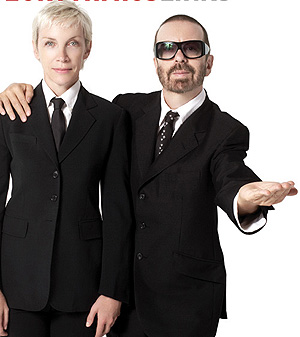
DS: No, that was something between Ringo and Mark. I think Mark was
going to do a TV show or something where he was a judge. And then
obviously Ringo had to carry on making his record and so that’s
when Ringo asked me to sort of finish the record with him.
MWE3: Did you use the silver Strat on Ringo’s record?
DS: Probably. And I used strings on Liverpool 8. I bring in
the strings and all that stuff. Funny thing is, I do use lots of other
guitars. I use big fat Gibsons a lot, acoustics, for recording. I
use Les Pauls, because in recording situations I tend to want to create
different guitar tonalities and stuff. And stuff for slide. I use
Gretsch, big Gretsch White Falcon Country Gents. The amount of guitars,
sounds and different guitars that I put on one track, even just for
two notes.
MWE3: So you must have a varied collection of guitars.
DS: (laughter) I would say 50 to 75 guitars that are in some kind
of regular use.
MWE3: You spoke about recording with George Harrison who was a big
Gretsch fan. Do you prefer the Gretsch or the Strat sound?
DS: It’s completely different kind of reasons and rhymes for
using them. Funny enough, all of the Wilburys first album was recorded
in my house, in my back garden studio. So those pictures you see of
them sitting under the tree with the Gretsch’s and all that.
That’s all in my back garden. All of those guys were all obsessed
with a kind of sound and I understand it. But when you’re making
lots of different kinds of records...(loud noise). That’s my
kidding shouting on my cell phone. My cell phone’s ring tone
is my kids shouting.
MWE3: You were telling me about the Traveling Wilburys recording at
your studio.
DS: My garden. Because George Harrison was living in my house in L.A.
And I was living in his house in Henley. You know, we were like really
great friends. Then I introduced the idea to Bob Dylan of having Tom
Petty & The Heartbreakers as his band you know? And then they
met round my house and then George was living in the house. It all
kind of came together. George went to see Bob and he saw this flight
case in the studio that I actually built for Bob (laughter) in his
house. I told him he should have a studio in the garage and he did.
George was in there and then he saw handle with care, written on one
of the flight cases. That’s how it all began.
MWE3: There were some amazing Gretsch guitars on the first Wilburys
album. Were any of those guitars yours?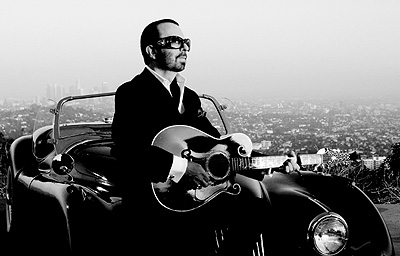
DS: That was all theirs. There were guitars from all over the place.
Then they brought out a Wilburys guitar remember? 1990...
MWE3: Are you still working with Greenpeace?
DS: Well I’m working with a guy called Mark Walford, who was
20 years with Greenpeace and now we work together and we’ve created
something called Lover Earth. And it’s a kind of Weapons Of Mass
Entertainment strategy. I’ve flipped the name from Mother Earth
into Lover Earth ‘cause I though it was more sexy (laughter)
in a way. It’s a thing about marrying together entertainment
business in a way that is gonna be sort of not detrimental to the
earth. In a sexy way. In a groovy way. Again not lecturing about you
know... You know my daughter came up with the best green idea I ever
heard the other day. She said, ‘You know daddy if everybody’s
meant to recycle, why don’t they, when the traffic lights change
to green, it just says recycle at the same time. It’s such a
good idea because it wouldn’t cost hardly anything to do right?
And it would subliminally go into everybody’s mind you know?
MWE3: It can’t hurt to be reminded about these things.
DS: But imagine how many times people would be reminded globally every
second.
MWE3: People are afraid when they stop at stop lights anyway so you
can actually get a chance to program them. And there’s nothing
to do except watch those colors anyway.
DS: Exactly! You’ve got the whole world staring at them. (laughter)
MWE3: Captive entertainment at its finest.
DS: That’s the whole classic sort of way of thinking. It’s
out of the box. She’s a chip off the old block. She’s only
seven by the way.
MWE3: I saw some pictures of you and Deepak Chopra. Deepak seems to
be able to persuade people in a non-threatening, educational way.
DS: Exactly, that’s what its all about. I’ve known him for
years and years. I met him in India. We were supposed to talk to the
same people in Bombay. I’m friends with the whole family. So
he’s just somebody that I talk to a lot. He’s a great guy.
He manages to put complex things into simple layman’s language
so that people can read or be educated and not feel like they’re
being bamboozled.
MWE3: Are you planning any more soundtrack work? I know you worked
on the Alfie soundtrack a few years back.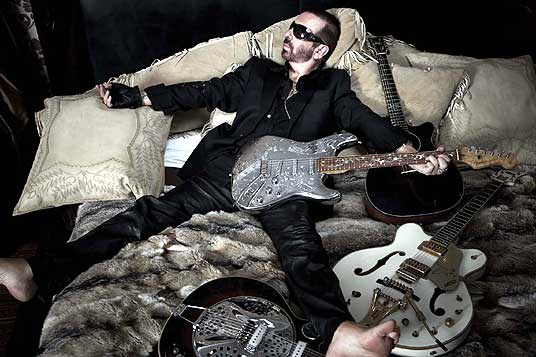
DS: Yeah, Mick and I. I’m playing that song in the show. See
in the show, it’s full on songs that I’ve written with many
different people. And I think about ninety percent of the songs are
all big hits. And Mick Jagger and I won the Golden Globe for that
song “Old Habits Die Hard” which was taken from the film.
But we did the whole soundtrack album together. And I really love
some of the songs on it like “Blind Leading The Blind” and
“Let’s Make It Up,” which is another song from that
album. But on the soundtrack front, I get offered stuff all the time.
I’m creating my own film and concepts now. And the first one
is being produced by John Williams, who produced Shrek. That’s
being announced very soon and that’s full of music. It’s
going to be an animated feature. So I’m still involved with that
but at the moment, I’m still focused on creating this book, this
21 track album and going to play live for the first time I’ve
ever toured America as myself...is a bit overwhelming to say the least.
So I really am making sure that when people go to that show, when
the curtain drops, people go, ‘holy shit,’ with the spectacle
of it all and also the songs. One after the other.
MWE3: And they’re all great songs. It’s just amazing how
many great songs the Eurythmics had. And I guess you’ll be playing
some of your solo songs too.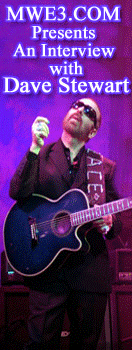
DS: Yeah, well I’m doing songs like “Don’t Come Around
Here No More,” which I wrote with Tom Petty, “American Prayer,”
which I wrote with Bono, which is going to have a video out before
the shows. Obviously, “Sweet Dreams,” “Here Comes The
Rain Again,” “Missionary Man,” “Would I Lie To
You.” All these kind of songs. And then songs that people don’t
realize like Celine Dion’s launch of her album. The single’s
called “Taking Chances” but actually is a song written by
me and Kara DioGuardi for our psychedelic project called Platinum
Weird. So people will know the song but the way I play it will be
very different. Then I’m doing “Greetings From The Gutter”
which is a song I did for my album. And I’m playing a song that
was (written) with Bryan Ferry, and with Sinead O’Connor, with
Gwen Stefani, which was a big hit, “Underneath It All” by
No Doubt. So, a whole sort of wall of songs, one after the other.
But I made them all fit together by having the orchestrations and
all.
MWE3: It’s just amazing how up to date everything sounds on the
double CD Songbook release. It’s hard to believe its been
25 years since the Eurythmics heyday in the ‘80s.
DS: Yeah, well since 1983 when “Sweet Dreams” was number
one, it’s 25 years of output. So, that’s why it says Songbook
Volume One. Obviously ‘cause its got 21 songs and stories
their stories behind them. But there’s obviously a hundred.
MWE3: I know you’re also working with Nokia now too?
DS: Yeah, I am because I’m very interested in the future of how
young bands and artists in general not only get to distribute their
music but how they get paid fairly for it. And how people then, consumers
or fans or whatever, what’s their experience gonna be like in
the future. And so I got hired as an advisor and my title is change
agent, sort of looking at ways in which to create new disparate sort
of business models that work for both sides. And that’s very
interesting.
MWE3: Sometimes its the spontaneous things that happen in a second
that kind of take your life in a different direction. There’s
always hope.
DS: Exactly, well I’m about to release a video with a sense of
hope and with lots of other artists featured in it. And it’s
for a song I wrote with Bono but I’m making the video myself.
I’ve already got Cyndi Lauper and Whoopi Goldberg and Alicia
Keyes and various people on it. It’s called “American Prayer”
and in the Songbook too and I’m playing live in the show.
So that’ll be coming on the web in about a couple of weeks.
Thanks to Dave Stewart @ www.DaveStewart.com
- I-D PR and Surfdog Records.
